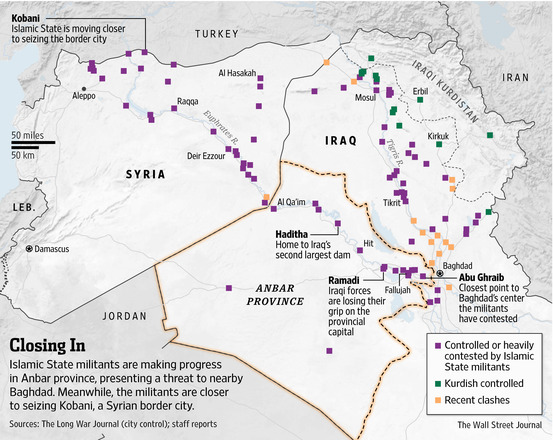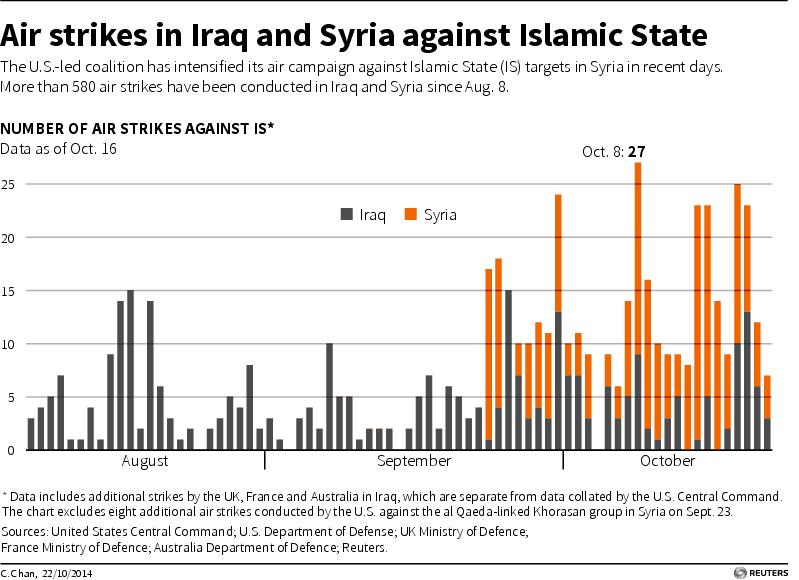Ali Alsumery, a 38-year-old writer living in central Baghdad, still comes home after curfew despite the recent months of fighting with ISIS. “I am one of those creatures who only comes home after midnight. Life in Baghdad hasn’t changed much except in the first two days after the fall of Mosul. After that, things went back to normal. Sometimes police let people move in the streets despite the curfew because there are so many people out there,” said Alsumery, who eluded death several weeks ago when an explosion destroyed a café that he frequented regularly.
Baghdad’s “new normal” is not shared by most of its residents. “Wise people are very cautious in Baghdad now. Many people lock their doors before sunset. Even when they are sick, they avoid going to the doctor unless it is really necessary. We are afraid of the unknown,” said Tahsin al-Azawi, a 50-year-old businessman who lives on the edge of Sadr city, the overpopulated Shiite slum in northeastern Baghdad. “We worry about our sons and daughters more than ourselves.” al-Azawi brother was killed by a Shiite militia in 2007 in western Baghdad amid the sectarian fighting. He also had to leave his neighborhood, fearing for his life.
“Even when they are sick, they avoid going to the doctor. We are afraid of the unknown…. We worry about our sons and daughters more than ourselves.”
For 10 months, the Iraqi government forces supported by the Shiite militias battled ISIS near Baghdad and nationwide with little success. Meanwhile, ISIS has been drawing closer to the capital. It took control of the city of Fallujah, just 40 miles to the west of Baghdad, and parts of the city of Ramadi in Anbar province in January of this year. Whether the Iraqi forces have the training or even the will to stop ISIS is one of the big questions facing the Iraqi government, its allies in the Mideast, and certainly the United states, which has sacrificed more than any other nation to see a democratic Iraq.
Still, the Iraqi government forces have soldiered on; they have fought ISIS in Ramadi where some streets exchanged hands a dozen times. But the government at this point has little hope of retaking Fallujah where the U.S. Marines in 2004 fought the deadliest battles since the Vietnam War.
Related: The Merger of ISIS and al-Qaeda Could Cripple the Civilized World
In June, two provincial capitals Mosul and Tikrit, in addition to many other towns in Anbar, Nineveh, Salahuddin, Diyala and Kirkuk provinces, fell to ISIS amid a collapse of the government forces there. For three months, the militias and the Iraqi army failed to restore the city of Tikrit despite numerous attempts. The most recent offense started 10 days ago.

Despite the U.S.-led air campaign, ISIS managed to control the strategic town of Hit in Anbar and more parts of the city of Ramadi, leaving the Iraqi government forces surrounded in a few spots in a desperate situation. ISIS also killed an al-Anbar police commander who was a fierce fighter against the terrorist group, in a roadside bomb. Anbar provincial officials appealed in public for both the Iraqi Parliament and the U.S. embassy in Baghdad to deploy U.S. ground forces in Anbar.
“I am waiting for the approval of the international coalition and the central government to deploy foreign ground forces and solve the crisis in Anbar,” said Sabah Karhut, the chairman of Anbar provincial council. Otherwise, the province will fall in days and Baghdad would face an immediate threat, the officials warned.
Related: The New U.S. Price Tag for the War Against ISIS: $40 Billion a Year
Last Friday, Iraq claimed that ISIS attacked troops with chemical weapons. Iraq suspects it was chlorine gas, according to the AP, and that 40 troops and militiamen were affected but recovered quickly. No one knows if the crudely made bombs were part of the cache of chemical weapons used by Ali Hassan al-Majid, also known as Chemical Ali, or if the bombs were freelanced by ISIS.
If Baghdad Falls
ISIS has always kept close eyes on Baghdad. In mid-October, news began to circulate that ISIS fighters were now in Abu Ghraib, the western edge of Baghdad, heightening the panic among some residents.
General Martin Dempsey, said that U.S. Apache helicopters helped repel an ISIS offensive on Baghdad airport. Yet curiously, he later told CNN, “I don’t see Baghdad falling.”
The fall of Baghdad would mean the fall of the nation to ISIS. Both U.S. military commanders and Iranian civilian officials stated publicly during the last few weeks that their countries’ interference prevented the fall of Baghdad to ISIS. Both have military advisers in Iraq to train and equip the Iraqi government forces. General Martin Dempsey, chairman of the Joint Chiefs of Staff, said that U.S. Apache helicopters helped repel an ISIS offensive on Baghdad International Airport. Yet curiously, he later told CNN, “I don’t see Baghdad falling.”
The Iraqi government has denied that ISIS has reached Abu Ghraib. “Baghdad is protected and safe. It will not fall by the rumors of the tendentious,” Haider al-Abadi, the Iraqi prime minister, said during a military ceremony recently.
Not everyone believes that—not even the Voice of America, which reported on October 24, “While the U.S. military said the Iraqi capital is not under 'imminent threat,' officials are concerned the militants' gains in Anbar will provide the means for an assault on Baghdad's perimeter.”
Related: ISIS Delivers Shock and Awe with Weapons from the U.S., Russia and China
“ISIS members attacked the army checkpoints in the Sunni neighborhoods of al-Ameriya and al-Ghazaliya in western Baghdad. Some army units withdrew to Abu Ghraib and the Shiite militias replaced them and launched a counterattack and mass arrests,” claimed Muntadher Abu Mohammed, a 35-year-old local commander in western Baghdad. But Abu Ghraib residents have so far denied the news of ISIS advances there.
For some Sunni residents the “protected and safe” Baghdad is as bad or worse than ISIS control.
“There was some heavy fighting in al-Saqlawiya to the west from Abu Ghraib. But there is no fighting here,” said Abu Mohammed, a 50-year-old professor at Baghdad University who lives in Abu Ghraib. Other accounts suggested that ISIS fighters are present in al-Zeidan area, located six miles west of Abu Ghraib.
A Dangerous Conversion of Loyalties
For some Sunni residents, the “protected and safe” Baghdad is as bad or worse than ISIS control. Last April, then Iraqi prime minister, Nuri al-Maliki, told his Shiite allies in the government in a secret meeting that the army was no longer able to fight ISIS, and he would begin to rely on Shiite militias. As Mosul and Tikrit fell to ISIS in June, deploying the militias became a formal and public policy. However, a recent report by Amnesty International revealed widespread crime and human rights abuses committed by the Shiite militias.
Noori AL-barbootey, a 61-year-old lawyer, concluded ISIS control might be less cruel. “ISIS is already here in Baghdad and in all the other provinces,” he said. “The other groups have different names, but they share the same objective – killing, destruction, displacement and blackmailing. You name it. I have a friend whose son was kidnapped and he paid everything he had for his son’s ransom. He left Baghdad and he lives under ISIS’s government now in the north. He told me the other day over the phone that his ISIS is better than our government.”
“The problem of the Iraqi elite force is not in liberating the areas but in holding them afterwards.”
All Baghdad residents agree that ISIS advances have already damaged the local economy. “There is a depression due to the fighting and due to the fact that Baghdad is commercially cut off from several provinces now,” said Ahmed al-Abadi, a 49-year-old businessman from northeastern Baghdad. While large businesses are suffering, the food and clothing markets are making huge profits due to the increased demand during the holiday of Eid Al-Adhha.
Related: Obama’s Effort to Train Syrian Rebels to Fight ISIS Won’t Work
“People were shopping for clothes for Eid as if they didn’t have any. Restaurants are crowded. Prices of food and clothes went up as usual. The other annoying thing is the on-and-off ban on social media sites by the government,” said Suhaib Al-Saeed, a 40-year-old public servant who was displaced by ISIS in 2006 from his home in western Baghdad.
Baghdad Is Phase One… Then Kirkuk, Anbar
How likely is it that Baghdad will fall to ISIS? First, it is worth noting that Baghdad is a massive city of 80 square miles and a population of about eight million, a quarter of the country’s population. It is Iraq’s New York and Washington, D.C. together. The city is divided by the Tigris River. Each of the two sides has five major districts.
Shiites dominate four districts in the east and two in the west. The rest is dominated by the Sunnis. Nevertheless, about half of the population of Baghdad lives in the Shiite slum district of Sadr city in northeastern Baghdad, reflecting the same division nationwide. Shiites are the majority of the population, but Sunnis control more land.
Security experts and ISIS itself have confirmed that capturing Baghdad is an objective. Yet the group’s military strategy is likely to be focused on key infrastructure and political landmarks. For ISIS, the eastern side is insignificant. The western side, on the other hand, contains Baghdad International Airport on the southwestern edge of the city and the green zone by the river, where the government and the U.S. embassy are based.
The holy Shiite shrine of al-Kadhum is located in the northwest. To the north is Iraq’s largest military base, located in al-Taji, with an army air base, training school and a supply base.
ISIS’ Takeover Strategy
ISIS realizes that capturing Baghdad’s east side and green zone would be very costly. The most important objectives for ISIS would be to control the western side, take over the airport, and destroy al-Taji base. Inflicting physical damage on the shrine of Imam al-Kadhum is also strategic, as it may incite a massive reaction of Shiite militia violence against Sunnis in Baghdad and pull the Iranians deeper into the events in Iraq. This, in turn, will provoke the Sunnis to be more receptive of ISIS in Baghdad.
ISIS executed this strategy successfully in 2006 when it bombed al-Askary shrine in Samarra. The Al-Kadhumiya neighborhood where the shrine is located has been attacked many times in recent months, including a bombing two weeks ago that killed 24 people. One of the victims was a member of Parliament who served for a decade as the deputy minister of interior.
“ISIS fights in multiple fronts in Iraq… Its tactic is to drain and disperse the military efforts against it,” said Hisham al-Hashimi, an Iraqi security analyst with access to inside information on ISIS. Hashimi thinks that ISIS’ strategic objectives for the Baghdad region are Diyala (the province to the northeast of Baghdad) and the outer Baghdad suburbs, the “Baghdad belt.”
“ISIS depends on an elite force made of Arab and foreign fighters led by former Iraqi army officers. This unit is trained to storm military camps, security headquarters and prisons.”
“There are thousands of ISIS sleeper cell fighters in the Baghdad belt now. Since June 10, they have been getting closer to the belt from the north and the west. They want to destroy the al-Taji military compound (to the north of Baghdad) and control Baghdad International Airport. Once they find a gap in the areas of al-Tarmiya (near al-Taji compound) or Abu Ghraib (near the airport), they will engage in fierce battles,” al-Hashimi says.
The Iraqi Army – A Serious Deficit
American military advisers have concluded that only half the Iraqi army units are prepared to fight. In Baghdad, there are four army divisions and three federal police divisions in addition to tens of thousands of fighters from four Shiite militias. While each division should have at least 10,000 soldiers, the widespread corruption that has enrolled numerous ghost soldiers might leave only 5,000 soldiers per division at best. There is also the “golden division,” the commando division that has been effectively fighting ISIS for the last 10 months.
“Iraqi forces are protecting Baghdad with the paramilitary units that fought in Syria. That is too risky. The sleeper cells in the Baghdad belt are very experienced in fighting,” said al-Hashimi. “They also hate these militias so much. They know better about the military geography of the ground and how to maneuver in it because it is their ground. The problem of the Iraqi elite force is not in liberating the areas but in holding them afterwards.”

ISIS also relies on its own commandos. “ISIS depends on the battalion of the Shield of Islam,” adds al-Hashimi. “It is an elite force made of Arab and foreign fighters led by former Iraqi army officers,” said al-Hashimi. “This unit is trained to storm military camps, security headquarters and prisons. Then the sleeper cells awake to hold the ground in term of administration and security.”
The man who will decide when to attack Baghdad is the commander of this battalion, Abu Muslim al-Turkomani, who also commands the ISIS military council. He is a former lieutenant colonel in the Iraqi army. “He has long experience fighting in the field,” adds al-Hashimi.
During the last few days, Iraqi government forces with the help of the Shiite militia managed to retake the strategic town of Jurf al-Sakher, 40 miles southwest of Baghdad. Like the streets of Ramadi, this town also exchanged hands several times.
ISIS may seek to achieve a stalemate situation in Baghdad, similar to several Syrian cities in which parts are controlled by the government and other parts are controlled by the rebels. ISIS is also planning a large attack on the oil-rich disputed city of Kirkuk. So designing a specific threat in Baghdad might serve the goal of distracting attention from Kirkuk. The same applies to Anbar.
Regardless of who will win Baghdad, some Iraqis have seen too much. Mayyadah Algbore, a 41-year-old public servant, said, “Nothing affects us anymore. We are just bodies that walk with no souls or consciousness. Our fate is in the hand of Allah.”
Top Reads from The Fiscal Times:




